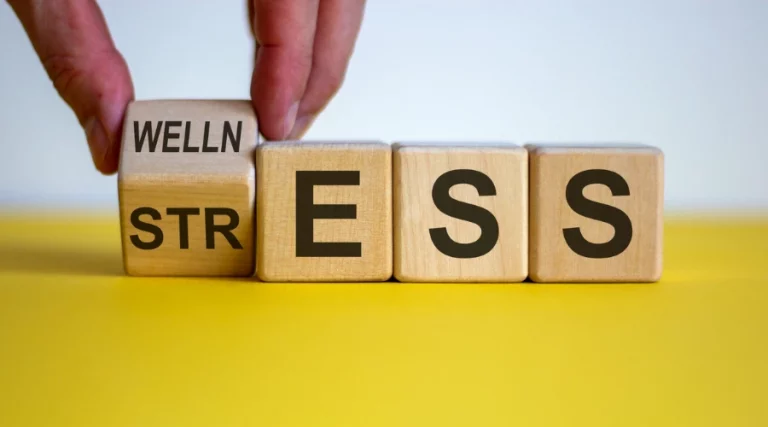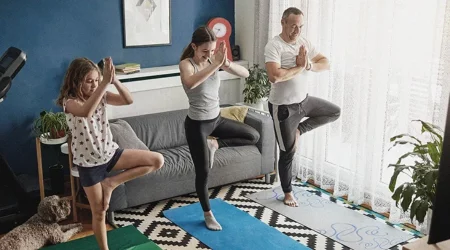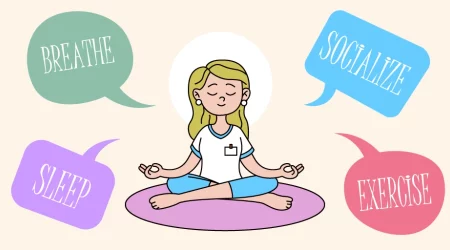Stress can be a difficult thing to manage, but it doesn’t have to be that way. Taking time out of your day to de-stress is essential to maintaining good mental health. Luckily, there are many simple and easy ways to do just that – and they can be done in as little as five minutes. From deep breathing and stretching to writing down your thoughts and playing with a pet, these 9 easy ways to relieve stress in just 5 minutes or less can help you take a break from the day and get your mind and body back on track. So, if you’re feeling overwhelmed and in need of a quick break, try any of these stress-relieving techniques and get back to feeling better in no time.
1. Deep breathing
Deep breathing is one of the simplest ways to reduce stress and a great way to start any de-stressing routine. Simply take slow, deep breaths in through your nose, allowing your stomach to rise with each inhale, and exhale through your mouth while letting your stomach fall. You can do this while lying down, sitting, or standing – whichever is most comfortable for you. If you want, you can even place one hand on your stomach and the other on your chest to feel the difference in your breathing, which may help you better understand why deep breathing is so helpful when you’re stressed. Deep breathing is a great way to combat stress for many reasons. First, it slows down your heart rate and helps bring your body back to a calmer state. Additionally, it clears your mind and reduces stress hormones that build up when you’re feeling anxious or stressed. Deep breathing also increases oxygen flow throughout your body and promotes a general sense of relaxation.
2. Journaling
Journaling is one of the best ways to relieve stress and has also been shown to improve your mood, reduce anxiety, and boost self-esteem. Journaling is more than just a way to relieve stress – it can be an enjoyable and cathartic experience that allows you to gain clarity and insight into your thoughts and feelings. There are no rules when it comes to journaling. Simply writing down what’s on your mind can be incredibly helpful in reducing stress. You can focus on the past, present, or future, write about your fears, hopes, or dreams – whatever you need to get out. You don’t even have to finish writing if you don’t have time. Just writing a few sentences can be more helpful than you might think.
3. Stretching
Stress has been known to cause muscle tension and even headaches – and it’s also been linked to constricting blood flow. So, if you’re stressed, you may notice that your muscles feel tense and stiff. Stretching is a great way to combat this and release tension in your muscles and tendons, helping you feel physically more relaxed and at ease. When you’re stressed, you’re probably not moving around as much as you should be. So, take that extra time and be sure to get up and stretch your body to reduce muscle tension and improve blood flow. You can do this lying down, sitting, or standing. There are a variety of great stretches you can do while you’re stressed. For example, a simple shoulder shrug and neck roll can help relax your muscles and ease tension in your upper body. You can also try a few knee bends, sitting toe touches, and leg and foot stretches. Stretching doesn’t have to be complicated – even just a few stretches can make a big difference.
4. Going outdoors
Being outdoors is one of the easiest ways to relieve stress – and it can also be a great way to get some exercise while you’re at it. Going for a walk or a run outside, or even gardening or fishing, can help clear your mind and reduce feelings of stress and anxiety. You don’t have to push yourself too hard or for too long – just being outside for a few minutes can help lower your blood pressure and relieve stress and anxiety. Simply going for a walk outside in nature has been shown to lower cortisol levels and blood pressure, as well as relieve feelings of anxiety. This is likely because being in nature has been shown to be very restorative and reduce feelings of stress and anxiety. So, taking a break from city life and spending some time in nature can be a simple yet effective way to lower stress and anxiety levels.
5. Aromatherapy
Certain scents have been shown to have stress-relieving effects, and they can be used both at home and while you’re out and about. Essential oils, like lavender, peppermint, and sandalwood, have been shown to reduce stress and anxiety, improve mood, and increase feelings of happiness. There are many ways you can use scents to de-stress, such as by burning a candle, spraying essential oils in a diffuser, or applying them topically. To use scents topically, you can add a few drops of essential oils to a teaspoon of coconut oil and rub it on your hands or temples. You can also put essential oils in a spray bottle and spritz them on your sheets or pillows before bed. Nowadays, there are many scents and ways to use them – so you can choose the one that works best for you.
6. Listening to music
Music is a great way to relieve stress and has been shown to reduce cortisol levels and increase dopamine. Whatever type of music you enjoy is a good choice for de-stressing – it doesn’t have to be classical or something relaxing. If you’re stressed, try putting on your headphones and turning on your favorite music. Let yourself get lost in the music and get your mind off the day and any stress or worries you’re experiencing. You can also try singing or humming along – letting yourself be silly and having fun with it can help reduce stress and bring joy into your life. Listening to music is a simple way to reduce stress and improve your mood. Studies have shown that music can lower cortisol levels and blood pressure, as well as reduce feelings of anxiety. It can also improve your mood and help you relax. This is likely because music has the ability to take you to a different place – whether it’s to a certain time in your life or a place you’ve never been. So, whether you prefer classical, heavy metal, or anything in between, listening to music can be a great way to reduce stress.
7. Playing with a pet
Studies show that simply petting a dog or cat can lower levels of cortisol and increase serotonin. Simply sitting and petting your pet for a few minutes can be enough to reduce stress levels. If you don’t have a pet, you can visit a pet store or shelter and pet a few dogs – many shelters are always looking for people to visit and pet their dogs. Pets are also great company, so spending time with one can also help you get in some extra human connection. Studies have shown that simply petting a dog or cat can lower levels of cortisol and increase serotonin. Simply sitting and petting your pet for a few minutes can be enough to reduce stress levels. If you don’t have a pet, you can visit a pet store or shelter and pet a few dogs – many shelters are always looking for people to visit and pet their dogs. Pets are also great company, so spending time with one can also help you get in some extra human connection.
8. Color a picture
Coloring is a simple way to reduce stress and regain control over your thoughts. Studies have shown that coloring can lower cortisol levels, reduce anxiety, and help you get in a more relaxed state. If you enjoy coloring and haven’t done it recently, now could be a great time to pick it back up. There are many great coloring books and pages online that you can print and enjoy. Or, you can get an adult coloring kit and add some color to your walls. Simply filling in the space with color can be a relaxing and meditative experience. Coloring is a simple way to reduce stress and regain control over your thoughts. Studies have shown that coloring can lower cortisol levels, reduce anxiety, and help you get in a more relaxed state. If you enjoy coloring and haven’t done it recently, now could be a great time to pick it back up. There are many great coloring books and pages online that you can print and enjoy. Or, you can get an adult coloring kit and add some color to your walls. Simply filling in the space with color can be a relaxing and meditative experience.
9. Doing something creative
Creativity has been shown to reduce cortisol levels, boost mood, and help reduce stress. If you enjoy drawing, painting, or any other type of creative art-making, this is a great way to relieve stress and get your creative juices flowing. Many people find that being creative helps them release stress


